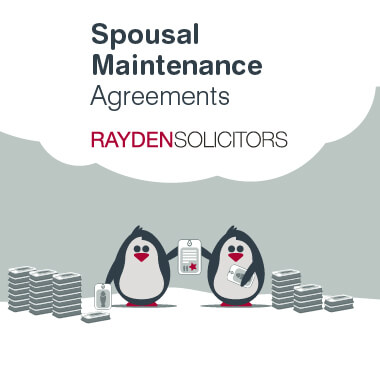

Spousal maintenance is a complex element of any divorce. Our specialist family lawyers have expertise in dealing with spousal maintenance claims and can provide helpful guidance. Whether you are seeking spousal maintenance, or indeed, your spouse is seeking it from you. It is important to secure such advice at an early stage of your separation.
What is Spousal Maintenance?
If you and your spouse are considering a divorce/dissolution, you have certain claims against each other that are enshrined in law. One of these claims is for spousal maintenance, also referred to as periodical payments, under the Matrimonial Causes Act (MCA) 1973 and the Civil Partnership Act 2004.
If periodical payments are ordered, then one party pays the other party a sum of money, generally monthly, for a period of time to meet that person’s income needs (i.e. financial outgoings). These are only ordered by the court after consideration of section 25 of the MCA 1973 which sets out what matters the court shall have regard to. These include, under subsections (a)-(h), as follows:
- the income and earning capacity of both parties, for now and the foreseeable future;
- the financial needs and obligations of both parties to the marriage, for now and the foreseeable future;
- the parties’ standard of living;
- the parties’ age and duration of marriage;
- any physical or mental disability of either parties;
- contributions the parties have made or are likely to make in the foreseeable future towards the marriage and the family;
- both parties’ conduct; and
- the benefit that both parties obtain from the marriage which they may lose upon divorce or annulment.
It must be noted under section 28(3) of the MCA 1973 that if the payee is to re-marry or form a civil partnership after the divorce, then periodical payments will come to an end. They will not be entitled to apply for further financial provision.
Rayden Solicitors will work with you to consider all the relevant factors which apply to your case.
Types of Spousal Maintenance
The Court can make a number of different orders in relation to spousal maintenance:
- Maintenance Pending Suit (MPS) – MPS is a form of interim maintenance where the court will determine whether one party needs financial help to cover their income needs pending the divorce until a further order can be made. Here, the focus is on the immediate needs of the parties.
- Nominal Periodical Payments – These are where a minimum amount of payment may be ordered, such as a few pence per annum, to keep the option of periodical payments open. This is usually done as a safety net in case the situation of one of the parties changes and periodical payments may then be needed in the future. For example, if they cannot work anymore or have young children which make it difficult to maintain their current income.
- Fixed Term Periodical Payments – Under section 25A of the MCA 1973, the courts prefer for there to be a clean break of financial claims between the parties wherever possible and want parties to be financially independent as soon as practicable. Therefore, they may set a fixed term for periodical payments, for example, 5 years. This enables a period of time for the payee to re-train or increase their income.
- Lifetime Periodical Payments (Joint Lives) – A Joint Lives Order is not common, but it may be granted where one party has a significantly higher income than the other and where it will be difficult for the payee to attain financial independence.
- Secured Periodical Payments – If there is a possibility that the payer may not comply with the payments, then these can be secured against another asset which would be used as a security in a situation where the payments have not been made.
- Extendable or Non-Extendable Periodical Payments – Periodical payments may be extendable or non-extendable. If the term of the periodical payments is extendable then an application to extend must be made before the expiry of the term. The court would consider all the circumstances of the case to decide whether extending the term would be reasonable. If there is a section 28(1A) bar on the order, this means that the term of the order is non-extendable and an application for further maintenance cannot be made.
How does Spousal Maintenance work?
As mentioned above, spousal maintenance is ordered on the basis of the financial resources and income needs of the parties. There is no set formula for calculating the amount of financial support that the payee should receive. Judges consider maintenance on a case-by-case basis with reference to the checklist under section 25 of the MCA 1973. However, ‘fairness’ is the overarching aim, and the court will try to make an order enabling a financial clean break between the parties.
If there are sufficient capital assets, the court can capitalise maintenance. The court would order the payer to make a lump sum payment to the payee in lieu of ongoing maintenance.
How do I apply for Spousal Maintenance?
The court can either be asked to determine the issue of spousal maintenance or it can be agreed outside of the court process. Either way, a court order should be obtained to reflect any spousal maintenance to be paid. If an agreement cannot be reached, either party to the marriage may apply to the Court for spousal maintenance, along with the other claims each party has.
A Form A is used to set out a party’s intention to proceed with an application for a financial order. However, parties must attend a Mediation Information and Assessment Meeting (MIAM) before this application is made, unless an exemption applies. In the mediation process, an independent mediator will try to help both parties negotiate and reach an agreement. It is generally a less expensive method of resolving the finances on divorce compared with court proceedings.
If mediation is not suitable then a Form A can be issued at court. Finances on divorce are a complex area of law, however, lawyers at Rayden Solicitors have the experience and knowledge to guide you and provide you advice which is tailored to your specific situation.
Rayden Solicitors is committed to equality and diversity and in doing so supports and advises all members of our community.
Spousal Maintenance FAQs
How long does Spousal Maintenance last?
Generally, an order for spousal maintenance will come to an end on the re-marriage of the payee, or the death of the payee or the payer. Otherwise, it may also come to an end after a fixed term if this has been set out in the financial order.
What is a Nominal Maintenance Order?
Nominal maintenance is where the payee is able to meet their current financial needs but there is a risk that they may not be able to do so in the foreseeable future. To protect their future income needs, the court may make a Nominal Maintenance Order to keep their possible spousal maintenance claim open, but it will be at a very minimum value of a few pence per annum. In practice, no money will change hands.
Who can apply for Spousal Maintenance?
Any party who is married or in a civil partnership is able to apply for spousal maintenance. Where the parties are cohabiting but not married or in a civil partnership, spousal maintenance is not available, regardless of the length of cohabitation.
Speak to us
If you would like to arrange a first meeting or have any questions, please contact us or fill in the enquiry form below.











